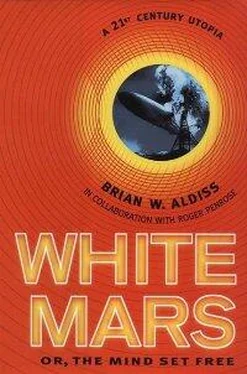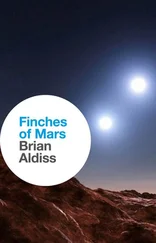Brian Aldiss - White Mars
Здесь есть возможность читать онлайн «Brian Aldiss - White Mars» весь текст электронной книги совершенно бесплатно (целиком полную версию без сокращений). В некоторых случаях можно слушать аудио, скачать через торрент в формате fb2 и присутствует краткое содержание. Год выпуска: 1999, ISBN: 1999, Издательство: Little, Brown UK, Жанр: Фантастика и фэнтези, на английском языке. Описание произведения, (предисловие) а так же отзывы посетителей доступны на портале библиотеки ЛибКат.
- Название:White Mars
- Автор:
- Издательство:Little, Brown UK
- Жанр:
- Год:1999
- ISBN:0-316-85243-0
- Рейтинг книги:5 / 5. Голосов: 1
-
Избранное:Добавить в избранное
- Отзывы:
-
Ваша оценка:
- 100
- 1
- 2
- 3
- 4
- 5
White Mars: краткое содержание, описание и аннотация
Предлагаем к чтению аннотацию, описание, краткое содержание или предисловие (зависит от того, что написал сам автор книги «White Mars»). Если вы не нашли необходимую информацию о книге — напишите в комментариях, мы постараемся отыскать её.
White Mars — читать онлайн бесплатно полную книгу (весь текст) целиком
Ниже представлен текст книги, разбитый по страницам. Система сохранения места последней прочитанной страницы, позволяет с удобством читать онлайн бесплатно книгу «White Mars», без необходимости каждый раз заново искать на чём Вы остановились. Поставьте закладку, и сможете в любой момент перейти на страницу, на которой закончили чтение.
Интервал:
Закладка:
And at this point, someone laughed. It was the murderer, Peters, under mentatropy, who to many remained an outcast.
Others idly joined in the laughter. Feneloni looked confused and sat down, muttering that people who took him for a fool would soon find they were wrong.
It was agreed that the “Rivers plan” should be implemented, and allowed to run for a test period. The universe was too young for an emphasis to be laid on tragedy.
Volunteers were called for. They would be vetted and asked for their qualifications.
As usual, the proceedings were recorded, and the decisions arrived at entered on our computers.
My state of mind was low. Although we seemed to be making progress, I feared some malignant force from within might burst like a cancer into the open and render our plans and hopes useless. Outside, beyond our spicules, beyond our community of 6,000 biological entities, was the great indifferent matrix, a confusion of particles inimical to humanity.
And there was Olympus, monstrous and enigmatic. It was never far from our thoughts. Like life itself, it seemed imponderable, its laboured progress somehow a paradigm of the approach of illness.
It was in this glum mood I looked in on the C of E, the Committee of Evil, holding its weekly meeting. The rather comical title had been dreamed up by Suung Saybin, but the purpose was serious enough: to try and determine the nature and cause of evil, with a view to its regulation. “Perhaps the humour lies in the fact that they haven’t a hope,” I thought to myself. Maybe the committee was just another way in which people kept themselves amused.
Suung Saybin remained as chair and Elsa Lamont, she of the orthogonal figures and an Adminex official, as secretary. Otherwise, members of the panel changed from month to month. As I entered, John Homer Bateson rose to his feet.
“The previous speaker wastes our time,” he declared. “We cannot eradicate evil by religion, or even control it, as history shows. All history is a demonstration of the workings of evil. Like Thomas Hardy’s Immanent Will, ‘it weaves unconsciously as heretofore, eternal artistries of circumstance’. Nor will reason work. Reason is frequently the ally of wrong-doing.
“Here we are, stuck on this little dried-up orange of a planet, and we plan to banish this monster? Why, we’re in its clutches! What are the component parts, the limbs, the testicles, of evil? Greed, ambition, aggression, fear, power … All these elements were integral to the very nature of EUPACUS, the conglomerate that dumped us here.
“What impossibly naive view do you have of the nations that stranded us? The United States is by no means the worst of them. But it seeks to extend its empire into space—apologies, matrix. All the grand designs we may have about exploring this matrix mean nothing to the absconding financiers who backed matrix exploration. All this talk of Utopia—it means nothing, absolutely nothing, to the greedy men in power. Power, money, greed—if you kicked out the present set of slimebags, why, more slimebags would fill the breach.
“I’ll tell you a story. It’s really a parable, but you’d distrust that term.”
“You have five minutes, John,” interposed Suung Saybin.
Ignoring her, Bateson continued, “A man was stranded alone on a planet that was otherwise uninhabited. He lived the blameless life of a hermit, befriending bats, rats, slugs, spiders—anything that amused him. That way, you attain sainthood, don’t you? One day, a vessel came down from space—pardon me, from the matrix—to rescue him. A grand sparkling ship, from which emerged a man in a golden space suit with long wavy blond hair and a manly tan, bearing a large picnic hamper.
“‘I’m your saviour,’ he exclaimed, embracing the hermit.
“The hermit got a good grip on the man’s throat and strangled him. Now he owned the spaceship. And the picnic basket.
“What, I ask you, were his motives? Hatred of intrusion on his privacy, hunger, envy of the golden suit, aversion to this intruder’s display of hubris, greed to possess the ship, ambition to enjoy power himself? Or all these things? Or had solitude driven him mad?
“You cannot resolve these questions—and I have offered you a simple textbook case. The promptings to evil are in all of us. Evil is not a single entity, but a many-splendoured thing. You’re wasting your time here if you think otherwise.”
I crept from the room.
Being unable to take lunch, I went to a remote upper gallery in search of solitude. Fond though I was of Cang Hai, I hoped to avoid her endless chatter. But there I happened upon my adopted daughter, sitting with her child playing at her feet. Alpha ran to me. I hugged her and kissed her cheeks. Cang Hai, meanwhile, picked up her sheets and assumed a pose whereby I was to take it she had been studying them.
“I’m surprised to see you up here, Tom. How are you?”
“Fine. And you?”
“Trying to learn some science. I’m trying to understand about superfluids. Apparently they are called Bose-Einstein condensates.”
Alpha said, “Mummy looks out the window.”
“Yes. I believe that’s what Dreiser’s ring contains.”
“I said, Mummy looks out of the window most of the time!” screamed Alpha.
“You can certainly learn science there,” I said. Under the endless panoply of stars, dark matter and particles, the Martian landscape rolled its dunescape away into the distance, unvarious, unchanging, and baked or frozen by turns. The thought came, What harm in trying to turn it into a garden?
“Is something troubling you?” I asked.
“No.” Then, “I try to study here, alone with Alpha. I’m glad, always glad, to see you.” Then, “Those lustful hounds I had to work with in Manchuria … No … Only the ambiguities of this research.” She tapped her 3D sheets. “Even light behaving like both waves and particles. It’s hard to grasp!”
“We’re subject to the dissolution of absolutes. Our life here is a bit ambiguous … Perhaps that’s why we question everything. But that’s not what’s wrong?”
After a pause, during which she took her child on to her knee: “I told you about Jon Thorgeson. He stays in my mind, making me unhappy. Or my behaviour does.”
“He was impertinent.”
“I don’t mean that. I mean … he wanted me. He was not unpleasant, physically. Why didn’t I—you know, let him get on with it? Why does that sort of thing not attract me? Is it that I’m … ? Well, I don’t know. It’s absurd to be a puzzle to yourself, isn’t it?”
“Mumma, let’s play, please, please, Mumma,” said the child, looking into Cang Hai’s face.
Whatever her failings, Cang Hai, a cloned person, possessed plenty of maternal instinct. As mother and daughter cosseted each other, I continued to gaze out at the world we had inherited—we, who must find a reason for this Martian testing ground, we, the creatures who had only recently learned to walk upright, who had harnessed fire not much more than a million years ago, who had emerged from various forgotten creatures—and who must be the forerunners of myriads more various peoples—oh yes, it was apparent why sex so dominated our thoughts … But there my reverie was broken by the child’s laughter.
I thought, as I turned back to this nervous, perceptive little person I loved—ah, but not one quarter as much as I had loved my Antonia!—how the Martian landscape was to me, as Charles Darwin had the phrase in one of his letters, not a landscape but “a most strange assemblage of ideas”.
I said, “It doesn’t have to be either/or, daughter. We have moved into a mode of both/and understanding.”
“I mean,” she said boldly, “am I a saint, a prude, or a lesbian?”
Читать дальшеИнтервал:
Закладка:
Похожие книги на «White Mars»
Представляем Вашему вниманию похожие книги на «White Mars» списком для выбора. Мы отобрали схожую по названию и смыслу литературу в надежде предоставить читателям больше вариантов отыскать новые, интересные, ещё непрочитанные произведения.
Обсуждение, отзывы о книге «White Mars» и просто собственные мнения читателей. Оставьте ваши комментарии, напишите, что Вы думаете о произведении, его смысле или главных героях. Укажите что конкретно понравилось, а что нет, и почему Вы так считаете.










